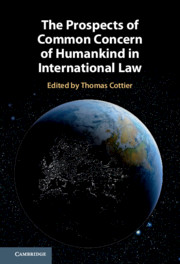Book contents
- The Prospects of Common Concern of Humankind in International Law
- The Prospects of Common Concern of Humankind in International Law
- Copyright page
- Contents
- Figures
- Contributors
- Preface
- Acknowledgements
- Abbreviations
- Part I Theory
- Part II Case Studies
- 2 Trade-Related Measures to Spread Low-Carbon Technologies
- 3 Marine Plastic Pollution as a Common Concern of Humankind
- 4 Exploring the Recognition of New Common Concerns of Humankind
- 5 Reshaping the Law of Economic Sanctions for Human Rights Enforcement
- 6 Migration as a Common Concern of Humankind
- 7 International Monetary Stability as a Common Concern of Humankind
- 8 Financial Stability as a Common Concern of Humankind
- Part III Epilogue
- Index
- References
4 - Exploring the Recognition of New Common Concerns of Humankind
The Example of the Distribution of Income and Wealth within States
from Part II - Case Studies
Published online by Cambridge University Press: 04 May 2021
- The Prospects of Common Concern of Humankind in International Law
- The Prospects of Common Concern of Humankind in International Law
- Copyright page
- Contents
- Figures
- Contributors
- Preface
- Acknowledgements
- Abbreviations
- Part I Theory
- Part II Case Studies
- 2 Trade-Related Measures to Spread Low-Carbon Technologies
- 3 Marine Plastic Pollution as a Common Concern of Humankind
- 4 Exploring the Recognition of New Common Concerns of Humankind
- 5 Reshaping the Law of Economic Sanctions for Human Rights Enforcement
- 6 Migration as a Common Concern of Humankind
- 7 International Monetary Stability as a Common Concern of Humankind
- 8 Financial Stability as a Common Concern of Humankind
- Part III Epilogue
- Index
- References
Summary
This chapter contemplates addressing changes in economic distributions within states from the vantage point of international law. It does this by considering the potential of recognising changing economic distributions within states and the adverse effects that flow therefrom as a ‘common concern of humankind’. At the outset, a contemporary conceptualization of the ‘distributive autonomy’ of states is provided in light of recent economic globalization. The process for recognising new common concerns of humankind is subsequently examined and theorised before the paper sets out the potential and utility of recognising a distributional common concern, arguing that the raison d’être for sovereignty, itself a constitutive element of common concerns, is the marshalling of the state in order to enhance the welfare of the individuals in a given society through the provision of peace and stability. The predominant utility of recognising a distributional common concern of humankind, then, would be to rebalance sovereignty in a manner that would place greater emphasis on effectively ensuring the welfare of humankind, something which can be better – or perhaps only – accomplished through international coordination and cooperation, actions which in and of themselves are less likely to occur under conditions of growing economic inequality within states.
Keywords
- Type
- Chapter
- Information
- Publisher: Cambridge University PressPrint publication year: 2021

